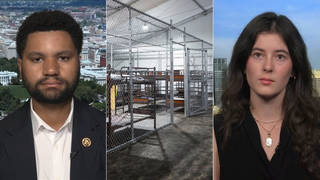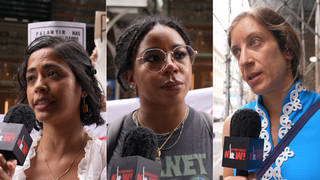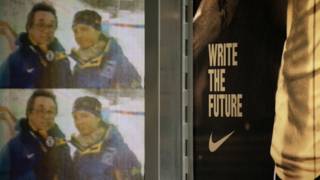
Guests
- adrienne maree brownExecutive director of the Ruckus Society, which brings nonviolent direct action training and support to communities affected by economic, environmental and social oppression. She sits on the boards of Allied Media Project and WireTap magazine.
Links
The National Conference for Media Reform isn’t just a gathering on media policy. It’s also an educational event for hands-on media activism and citizen journalism. Adrienne Maree Brown is the executive director of the Ruckus Society, which trains and supports social justice groups in nonviolent direct action. [includes rush transcript]
Transcript
AMY GOODMAN: The National Conference for Media Reform isn’t just a gathering on media policy. It’s also an educational event for hands-on media activism and citizen journalism. Adrienne Maree Brown is the executive director of the Ruckus Society, which trains and supports social justice groups in nonviolent direct action. The Ruckus Society has worked with groups including Wal-Mart Watch, Greenpeace, United Students Against Sweatshops, the Student Farmworker Alliance. She joins me right here on the convention floor, as we’re on the road in Minneapolis. Welcome, Adrienne, to Democracy Now!
ADRIENNE MAREE BROWN: Thank you.
AMY GOODMAN: It’s good to have you with us. What’s the Ruckus Society?
ADRIENNE MAREE BROWN: So, the Ruckus Society is an organization that’s been around for twelve years, and we do just what you said. We train people in using nonviolent direct action tactics, on really — we think of it more as civic engagement. It’s just a different way of involving yourself as a citizen in shaping the decisions that impact your life. But it’s sort of like, if you need to go a hundred miles an hour in order to get where you’re going, a lot of the organizing that happens in the world takes you to about sixty miles an hour. And when Ruckus is needed is when it’s at sixty and nothing’s changing. We take you from sixty to a hundred, so we escalate it.
AMY GOODMAN: I’ll never forget, at the Philadelphia convention, the Republican convention, when the police swooped down on the then-head of Ruckus Society, John Sellers.
ADRIENNE MAREE BROWN: Yeah.
AMY GOODMAN: And he was charged with — I don’t know how many felonies. His weapon was his cell phone.
ADRIENNE MAREE BROWN: Mm-hmm.
AMY GOODMAN: That’s where he was organizing people who were demonstrating.
ADRIENNE MAREE BROWN: Mm-hmm. It’s — I mean, it’s absolutely the case that it’s been very trumped-up charges against him. He had about $2 million bail, I think, set initially. And, you know, a lot of times the police are not quite sure how to respond to a nonviolent threat. And in this country, it’s actually been very, very politicized to engage in nonviolent direct action, especially since September 11. So stuff that we used to do very easily, dropping a banner off the side of a building or off the side of a bridge, now all the sudden it’s like, you know, possibly a terrorist attack or something. So we have to really be careful in how we train our organizers and our activists, so that they understand what the rules are, what the laws are. That’s a lot of the training that we do, but also making sure that people know that this is their right. It’s their right to have free speech. It’s their right to push the boundaries. It’s their right to directly communicate to their decision makers.
AMY GOODMAN: What’s media justice?
ADRIENNE MAREE BROWN: So, media justice is really the idea that the people can take media into their own hands and that everyone can have access to media, access to communicating their message and access to communicating their stories and hearing their stories. For us, a lot of it is about not just being in a place of information, right, which is wonderful — we want to have as much information as possible — but for those of us who are in a disenfranchised or disempowered communities, it’s about transformative media, being able to actually send messages in a way that changes the way people perceive stuff and helps to empower our communities. The term was coined five years ago at the Highlander Center in Tennessee.
AMY GOODMAN: Where Rosa Parks trained before she sat down on the bus?
ADRIENNE MAREE BROWN: Where Rosa Parks trained, where Martin Luther King was. I mean, there’s so many great legends that were trained there. And, you know, sitting up on that hill, you know, sitting around in the little rocking chairs, that term was developed. And it was really the idea of not just media reform, not just changing exactly what it is, but really striving towards justice for communities through media.
AMY GOODMAN: Can you give an example of attaining something through media activism?
ADRIENNE MAREE BROWN: I think a really beautiful example right now is the Coalition of Immokalee Workers, who just celebrated a victory against Burger King. And that struggle is very much an organizing struggle. You know, we’ve definitely been involved in going and training that group over years. But they are brilliant organizers. And they were able to point out that Burger King had hired folks and that were spying on the Coalition of Immokalee Workers as they were bringing their campaign against Burger King in order to raise the —-
AMY GOODMAN: And explain who the Immokalee Workers are.
ADRIENNE MAREE BROWN: So the Coalition of Immokalee Workers is farm workers coming out of Florida, primarily, and they’re talking about their picking tomatoes, right? The tomatoes that go onto Burger King sandwiches. And they’re saying, “We want to be paid a little bit more,” right? Basically a penny more for each pound of tomatoes.
AMY GOODMAN: They won their campaign against Taco Bell.
ADRIENNE MAREE BROWN: They won their campaign against Taco Bell, and they just won their campaign against Burger King, right? But it was only because they were able to identify that Burger King had been spying on them, and they were able to spread that message, because they had brilliant media tools and let their community know that they weren’t going to -— you know, Burger King would not be able to get away with this. That’s a beautiful campaign.
AMY GOODMAN: When you say “spying,” you mean that there were infiltrators?
ADRIENNE MAREE BROWN: There were infiltrators. There were folks who were getting information about what the Immokalee Workers were trying to do and in ways to, you know, obviously to circumvent justice coming to bear.
AMY GOODMAN: And then they learned one of the vice presidents that was negotiating with them —-
ADRIENNE MAREE BROWN: That was negotiating with them was also double dealing with it. So -—
AMY GOODMAN: — was using his own daughter, his high school kid’s account to send vicious email to the organizers at Immokalee Workers.
ADRIENNE MAREE BROWN: Yeah.
AMY GOODMAN: Can you share your own biography, Adrienne?
ADRIENNE MAREE BROWN: Yeah, I can. I am great. I used to work with a group called the League of Young Voters, which is a lot of why I’m still interested in what’s happening with the election and election protection, particularly this year. I came to Ruckus about two years ago. And as you said, John Sellers was the executive director then. The organization was founded mostly focusing on forest issues and, you know, really strictly environmental work and has grown and grown into focusing on human rights, social justice.
AMY GOODMAN: What do you mean by “election protection” and the whole coming together of the election protection and media reform movement?
ADRIENNE MAREE BROWN: Well, I think that they’re deeply, deeply interwoven issues. I think these are two ways that our voices get heard, right, in this country. One is through these media outlets, and one is through our vote. And I think in both arenas we have seen deep and inexcusable disenfranchisement happening or on the verge of happening, right? And I think that the sort of consolidation that’s happening in the media world, which, you know, Commissioner Copps was speaking about, you know, just is like watching this happen very quickly. We’ve also watched, over the last several elections now, stolen elections or unfair elections, but we haven’t seen a media that was willing and able to in the moment step up to that story and really handle it.
And I don’t think that we’ve been able to galvanize the people of this country in the moment in a way that really says, you know, the entire world is deeply impacted, we as citizens are deeply impacted, we are being sent to war, we’re looking at climate change at unreasonable amounts. Why is this happening to us? Because our voices are not being heard in these two deep arenas. And I deeply feel that, you know, I’m here to talk to this group about what they’re going to do in this election season to make sure that doesn’t happen again, regardless of who the candidates are. And it is exciting right now. This is a very exciting time to be voting in this country. But regardless of who the candidates are, our system is so flawed, and it doesn’t need to be. We know what to do. So it’s just calling people into action around that.
AMY GOODMAN: Your thoughts — and you’ve written about Barack Obama.
ADRIENNE MAREE BROWN: I have. Well, most recently I wrote a little piece that was — it was sort of half-silly, but coming from the heart of being an interracial child and watching this, you know, interracial man come into this space of being the president — potential president of this country, right? And everyone is just like, “He’s a black candidate. He’s a black candidate,” you know, which is the oversimplification that I think is necessary for this country and shows where we are, understanding race in this country. It’s like he must — he’s not white, he must be just black. But I think that there is a really interesting thing about him being mixed race.
AMY GOODMAN: You, too, have a white mother and a black father.
ADRIENNE MAREE BROWN: I certainly do, and I love them both. And I think there’s something very important about the kind of communication skills and the kind of bridge building and relationship building that’s needed that happens at the dinner table for those of us who grow up coming from two cultures, or more than two cultures, that I think is hard to pull off if you only come from one, right?
And I think, for this country right now, there’s a lot of healing needed. So many of the deep-seated issues we’re dealing with are grounded in race, not something else. You know, Katrina is not about anything but how do we look at race in this country. You know, how climate justice is happening in this country, it’s all about race. These of the lines that are separating. And with the election protection piece, if you overlap who’s impacted by climate injustice, who’s impacted by the war, who’s impacted by our economic policies, and then who’s being disenfranchised at election time, it’s the same lines.
AMY GOODMAN: Finally, what message do you have for journalists who cover this issue, the presidential election, but who cover how Barack Obama is defined? What do you say to them?
ADRIENNE MAREE BROWN: I feel that the important thing that a Barack Obama is saying to people is that it’s not him that is going to make this change. It’s not him that can suddenly revolutionize how this country is operating. It’s going to be all of these communities that are doing that. I feel like if journalists can find a story there, find all of these communities that are somehow galvanized maybe by the hope they’re getting from Obama or galvanized by this moment in history to make major changes, then that, to me, will be the powerful story that emerges, and that will be the way that we’ll come to the kind of justice we need in the election system, in our media systems, across the board in our policies. So we’re excited to see.
AMY GOODMAN: I want to thank you very much, Adrienne, for being with us. Adrienne Maree Brown is executive director of the Ruckus Society. She’s here in Minneapolis for the National Conference for Media Reform and will be speaking this weekend.













Media Options